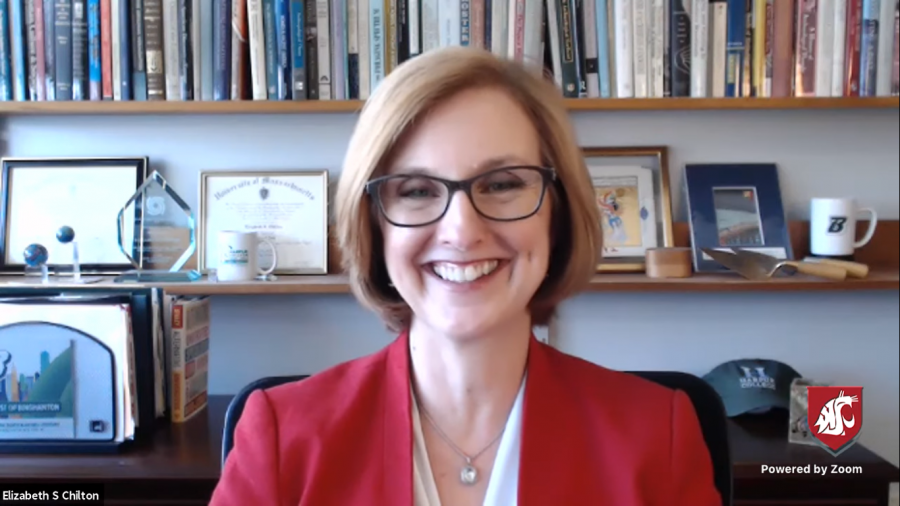University hears last provost candidate presentation
Goals include increasing communication between faculty, students struggling academically
Provost candidate Elizabeth Chilton said she is impressed by a statement in WSU’s strategic plan draft which states the university is committed to transforming the lives of students rather than chasing elite status.
April 21, 2020
WSU’s final provost candidate once heard her brother say that her anthropology major was a highly optimistic goal when she was a student.
“I don’t think he meant that as a compliment,” candidate Elizabeth Chilton said.
Chilton is the dean of the Harpur College of Arts and Sciences at Binghamton University. She presented her vision for WSU’s provost position on Monday, with provost search committee co-chairs Stacy Pearson and Julie Kmec in attendance via Zoom.
During her presentation, Chilton spoke about challenges higher education institutions face such as rising costs and inclusive access.
“As universities compete for the strongest students, sometimes diversity and inclusion are compromised,” Chilton said. “As a first-generation college student myself, I know just how critical an affordable and high quality education can be.”
Chilton said she was impressed by a statement in WSU’s strategic plan draft which says the university has a commitment to transforming the lives of students rather than chasing elite status.
“This is a really critical commitment now more than ever,” Chilton said.
In her previous academic leadership roles at the University of Massachusetts and BU, she implemented cluster hires and led studies in race and inequality to create a high quality and diverse faculty, Chilton said.
Cluster hiring is a process where new employees are hired in groups rather than individually. A 2015 report from three higher education organizations — the Coalition for Urban Serving Universities, the Association of Public and Land-grant Universities and the Association for American Medical Colleges — concluded that cluster hiring can increase faculty diversity.
“By diversifying the faculty, both universities have been able to strengthen our commitment to diversity and inclusion overall,” Chilton said.
Access Center assistant director Rochelle Dach said about six percent of students at WSU Pullman are connected to the center. Dach asked Chilton how she would create an inclusive academic experience for students with disabilities.
Chilton said she was surprised that six percent of WSU students received Access Center aid. According to the National Center for Education, nearly 20 percent of all undergraduate students reported having a disability.
“It may be a resource issue, it may be a communication issue to make sure students know what the resources are on campus,” Chilton said.
One method she has incorporated previously was having faculty members and academic advisers reach out to students who are struggling academically.
At BU, the number of students reaching out for assistance due to a disability or mental health has increased over the last five years, she said.
The university will now choose one of the four candidates to become its next provost: André‑Denis Wright, Robert McMaster, Tami Eitle or Chilton.
Viewers can submit feedback to the search committee about the candidates and their presentations by April 22.












